- Home
- Heather Sunseri
Death is in the Details Page 9
Death is in the Details Read online
Page 9
I chuckled. Aubrey was part of a shooting club with other women, mostly friends from church. They got together once a month to practice shooting their firearms, then went out for drinks after. Sometimes they even went out of town for weekend shooting retreats. She had tried to get me involved, but group activities just weren’t my thing.
“You’re home early,” I said.
“Yeah, since I can’t drink, I came on home. But it’s just me—Finch got called in for an emergency surgery on a cat.” She sighed. “You looking for dinner? I’ve got leftover lasagna. And a bottle of wine I bought but can’t enjoy thanks to this two-pound alien I’m growing.”
“I’d be happy to enjoy your wine and cooking. On my way.”
I drove through town toward their house. Just as I was about to turn into their neighborhood, a combination of sirens blared from somewhere behind me. In my rearview mirror, I saw a fire truck turn the corner and head straight for me. I pulled over and let the vehicle pass. Directly behind the fire truck was Uncle Henry in his red pickup truck, his red lights flashing up a fury, and before I could pull back out onto the road, two more vehicles—a Paynes Creek PD squad car and an ambulance—raced in from a different direction, passing through the intersection directly in front of me.
When I saw fire, police, and ambulance, I normally would assume they were headed for a bad car accident, but because they were going into a neighborhood, my mind jumped to a different conclusion. I decided to follow. I had my camera equipment in the back; I might be of some use.
The lights flickered behind homes and trees, and as I neared, I could see a gray smoke billowing into the night sky.
When I turned the corner on the last street in the back of the neighborhood—the street where Finch and Aubrey lived—I saw the flames shooting up and out from one of the homes. I was relieved to see it wasn’t Finch’s. But it was still Paynes Creek’s second devastating fire in less than a week.
I parked and got out, grabbing my coat and camera bag from the back seat. When I approached the police cars that were already positioned as a barricade, one of the uniforms lifted his chin in my direction. “Hi, Faith. They called you in quickly.”
I walked past him, giving him a nod.
Neighbors had gathered on the sidewalk across the street to watch. The firefighters had hooked up a hose to the fire hydrant and were spraying water to the second story. Other firefighters were fighting the lower-level flames with water from the truck. And I spotted my uncle close to the house, giving orders to one of the younger firefighters.
And then I saw something unexpected: Luke Justice. He was still in jeans, but had added a dark green barn jacket. He arrived with Chief Reid, and they were walking toward the ambulance, where EMTs appeared to be performing CPR on someone. Luke must have received the call right after I left Coop’s.
The EMT stopped his CPR, looked at his watch, then backed away from the gurney. Chief Reid shook his head.
Luke then spotted me. He said something to the chief, the chief nodded, looking in my direction, and Luke walked toward me.
“Hey,” he said. A casual hello, as if I hadn’t just run away from him. “Can you get photos of the crowd?”
“What?” I started to ask why, but then understanding set in. He was thinking that this fire might be arson, and he wondered if the person responsible was here to admire his or her handiwork. It was only then that I recognized whose house was on fire: this was the home of Sadie Porter, another teenage girl linked to Matthew Lake. “Of course,” I said.
“Be discreet,” he warned. He had kind eyes—the type that told me he truly cared about the victims of his crimes, which didn’t help me in my vow to stay away from him. Their forest green color, the same color as his jacket, simply pulled you in and made you want to stay a while.
I nodded. I wanted to ask who had died moments earlier, and if anyone else had been found inside the home, but I assumed I’d know soon enough.
Armed with my camera and a powerful telephoto lens, I stayed to the outer perimeter of the taped-off area without getting close to where the nosy and concerned neighbors gathered. I snapped pictures and made mental notes of anyone I recognized, changing angles and locations from time to time.
“Do they know what happened?” a familiar voice asked behind me.
“Thought you were off saving a cat,” I said to Finch without looking at him. I continued snapping photos.
“Mission accomplished. She’s in recovery. Is everyone okay? What happened?”
I lowered my camera and looked at him. “No. EMTs were working on one victim, but it looked like they were unsuccessful.”
“What? Was it one of the Porters?”
I shrugged. “No one has said.”
“Anyone else?”
“Don’t know that either.”
“Well, I’ll make sure the church knows so that they can add the Porters and their family and friends to the prayer list.”
“Look around. I’m sure the church already knows.” I glanced at Mrs. Kenney, who was standing with her longtime friend, Mrs. Tate, the widow of Mayor Tate, who had died just last year. He hadn’t actually been mayor in ten years, but everyone still called him Mayor Tate. Nothing happened in this town that Mrs. Kenney and Mrs. Tate weren’t aware of.
“True. Doesn’t take long for news to spread in this town.”
I spotted Luke again. He was speaking to Uncle Henry, but as if he knew I was staring at him, he looked up at me.
I turned to Finch. “I was actually on my way to your house to bum dinner off of Aubrey when the first responders sped past me.”
“Have you eaten?” he asked.
“Not yet.”
“Well, come on back to the house.”
“I’ll meet you there if I finish here soon.”
“What, exactly, are you doing?”
“Capturing the faces of the spectators.”
“You think someone set the fire on purpose? And that they’re still here?”
“Always a possibility,” I said with a shrug.
When Finch was gone, I turned toward Luke again, but he had moved. I scanned the area, looking for him, and examined the crowd one last time. It had thinned, but a line of gawkers still stood just beyond the police tape.
That’s when I saw him.
Ethan.
He was standing behind a small cluster of women, his face shadowed by a baseball cap. I couldn’t see his eyes or make out what he was looking at, but it was definitely him.
I didn’t want to believe he might have started these fires. But why else would he risk being here?
I slipped behind a police car and made my way toward him, weaving my way through the remaining people. But Marla Manfield stepped in my path.
“Faith Day, we meet again.” She blocked my view of Ethan. “Any idea what started the fire? Is it another case of arson? Do you know who lived here?”
My face hardened at her questions. Did she realize how cold she sounded?
“Marla, I know you’re smart enough to figure out that I know as much as you do at this time, and that even if I knew more I’m not in a position to reveal that information to you.” I pushed her aside and stretched my neck to spot Ethan again.
But by the time I’d gotten to where I had seen him, he was gone. I spun three hundred sixty degrees, but didn’t spot him.
Had he seen me and left? Had he seen Marla corner me?
I let out a long breath, remembering the morning when Ethan visited me in the hospital, right after our own house fire. I closed my eyes, attempting to squash the avalanche of memories, but it was no use.
Fourteen
I stared up at the white, tiled ceiling. The hospital room was dark. Machines beeped to my left. I tried to turn my head, but something stopped me. I moaned in pain, but hardly a sound came out. Tears ran down my face.
“You’re awake.” Ethan’s voice, on my right, whispering. “Don’t move. I’ll get a nurse.”
Ethan ran from the
room and returned with a nurse on his heels. “Hi, Faith. My name is Dalia. Can you tell me on a scale of one to ten how much pain you’re in? With ten being unbearable.”
I couldn’t even answer her. I just burst into tears. “Is my mom dead?” I asked. I wanted to hear someone say what I already knew to be true. I knew she’d been in the house—that was why I ran in to save her. And I saw her there, on the floor of the kitchen, flames all around her. I knelt beside her, pleaded with her to wake up. And I didn’t care that the flames were consuming the room and leaping onto my clothes. Just when I decided I didn’t care what happened to me and that I wasn’t leaving my mother, arms circled around me and pulled me backward.
Ethan’s arms.
He laid me on the ground outside the house. He put out the flames, patting me down with his bare hands and then with the shirt off of his own back.
“Sweetie,” Dalia said. She stroked the hair on the right side of my head. “Your mama died in the fire last night. I’m so sorry.”
I squeezed my eyes tight, sobbing silent cries due to a throat trashed by smoke inhalation.
Ethan stepped up behind Dalia. She glanced at him, then back at me. “I’ll give you two a minute while I go call the doctor and let him know you’re awake. Also, the police want to talk to you, and the fire chief has been calling constantly.”
When Dalia had left, Ethan sat in a chair beside me. He scooped up my right hand and leaned his head against our clasped palms. “I am so sorry, Faith. Can you ever forgive me?”
I stared at the top of his head, at his sandy-blond hair darkened from soot. Then I took in the left side of my body. Bandages covered my left arm. I was wearing a hospital gown, but I could feel the bandages reaching all the way up my neck. I wanted to ask Ethan how bad my injuries were. No—I wanted the nurse to come back so that I could ask her.
Ethan lifted his head. “I didn’t mean to hurt you,” he said. “I’m so sorry.” Tears touched his eyes. “Tell me what I can do to make this better.”
I blinked away my own tears. For the briefest of moments, I pushed away the vivid image of my mom and Eli lying dead on the kitchen floor. I met Ethan’s devastated expression. His face conveyed all the pain and heartbreak of a seventeen-year-old who had just lost his father—and he did look genuinely sorry.
“Get out,” I said softly.
Tears fell from his eyes. “You don’t mean that. You have to forgive me. You’re all I have now.”
“I never want to see you again.” I forced the words out louder this time, burning my throat with each syllable.
Ethan dropped my hand and stood. “Don’t push me away, Faith. You need me. We need each other. We both lost everything last night.”
“I lost more,” I whispered, and I closed my eyes.
Fifteen
When I was sure there was nothing more I could do at the scene, I took my camera and climbed into my car. I had lost my appetite, so I texted Finch and Aubrey to let them know I wouldn’t be stopping by.
Instead, I continued through town, compelled to drive down memory lane, past the spots where Ethan and I would hang out with friends during high school—mostly the parking lots of fast food restaurants. They were the highlights of many of our Friday and Saturday nights. I then drove through the parking lot of the library and over to the city park. I angled my SUV to shine the headlights on the swings where Ethan and I sat many afternoons, talking for hours. Tonight, the swings squeaked in the wind.
I leaned my head into the steering wheel. “What are you doing?” I asked myself. “Was Ethan even there tonight?” I had almost convinced myself that I had imagined him.
But I wasn’t crazy. He was definitely there.
I backed out of the parking spot and headed home.
My trailer was dark when I pulled onto the long drive, but as I neared, I spotted a vehicle parked in the turnaround spot. Luke’s vehicle.
I grabbed my camera bag—I would digitally process the photos first thing in the morning—and approached my trailer slowly.
“What are you doing here?” I asked.
Luke was sitting in one of the Adirondack chairs on my front porch, which was basically a low wooden deck. His hair was wet, and he was wearing different clothes and a different jacket.
“Waiting for you.” He stuffed his hands in his pockets and shivered.
“Why?”
“Because I’m hoping you’ll reconsider your stance on pushing me away.”
His face had that expression I see sometimes on detectives when a case hits them a little too deeply. “You want a drink?” I walked past him and stuck a key in the door.
He pushed himself up from the chair and stood behind me—so close I could feel his breath on the back of my neck. “No,” he said in a low, husky voice.
The muscles in my spine tensed. I dropped my hand slowly and turned. Looking up into his dark eyes, I realized I was powerless against whatever was happening between us—lust, passion, my need for someone to understand the memories that these fires were dredging up.
“Don’t tell me to leave,” he said. “I’ll leave if you tell me to. But please don’t.”
I stepped closer to him. I stared at his chest for a moment. Thinking. Processing consequences. He didn’t move.
I knew, as did he, that whatever happened would go no further than the length of this case—if it even went beyond this single night—which meant he could be using me. Or vice versa.
And that was okay. I could use him to add a memorable night to my memory collection. And maybe a good memory would help make one of the bad fade.
If only that were how my hyperthymesia worked.
Luke just stood there. Waiting for me to say something. Or do something.
I lifted my head. When our eyes locked, I didn’t have to say a word. He reached for my shoulder and lifted the heavy camera bag from it. His gaze burned into me; I could feel the heat all the way in the pit of my stomach. I turned and led him inside.
As he set the camera bag on my dining table, I shrugged out of my jacket.
“I reek of smoke,” I said.
“I don’t care.” He stepped toward me.
I lifted a hand to stop him from getting too close. “I’m going to shower. If neither of us has changed our mind by the time I get out, you can stay.”
The look in his eyes told me it would not be he who changed his mind.
A divider separated my bedroom, the bathroom, and my closet from the rest of the Airstream. I passed through and shut it behind me. Gus was stretched out across the middle of my bed and barely lifted her head when I entered.
“What am I doing?” I asked her.
She answered by stretching her front paws and then burrowing further into my down comforter.
I covered my face with my hands and raked them over my skin. Then I ripped my clothes off and went to the shower. Maybe some cool water would wake me up to what a colossal mistake I was about to make.
When I’d scrubbed the smoke smell from my hair and body, I got out of the shower, ran a brush through my hair, and grabbed the most unsexy T-shirt and sweatpants I could find in my closet.
I returned to the living area to find Luke flipping through the Paynes Creek Gazette, the local newspaper. For a small town, they did a good job of covering everything: political news, human interest stories, sports, and of course, the most-read section of any small-town paper: the weekly crime reports.
Luke didn’t look up, though he obviously knew I was there. “Did you know that Dick Taylor had twelve dollars worth of gas plus a gas can stolen out of his garage last week?”
The crime reports weren’t supposed to be comical, but they often were.
“Not sure why anyone would want to live in this crime-infested town,” I said.
Luke put down the paper and looked at me. Analyzed me was more like it. I suddenly regretted my choice in clothing. He slid out from the booth at my table, keeping his eyes on me.
“You probably should have left,”
I said weakly.
He stalked toward me. “I didn’t want to leave.” When he reached me, he didn’t touch me. He just stood there, looking down into my eyes.
I sensed he was seeing straight through me with his investigative mind. Did he know I was hiding things from him—things that might impact the direction of his inquiry? Things I’d never told a single soul? Would he still be standing here, looking at me like he wished I hadn’t bothered with any clothes at all, if he knew the baggage I carried—or that my silence might have helped an innocent man go to prison?
“Luke,” I said. “There’s something—”
In one motion, he slid a hand around my waist, planting it firmly in the small of my back, while placing his opposite fingers over my lips. “I know these circumstances aren’t ideal. I’m sure I’m breaking all sorts of professional and ethical rules. But for some reason, I don’t care.”
I think he knew the instant I let my gaze travel from his eyes to his lips that I, too, was ready to block out all possible objections to us being present in this moment.
His mouth captured mine in a demanding, brutal kiss. We stayed like that for several beats before he pulled back slightly, almost as if he’d thought better of the aggressive way he’d attacked.
I arched into him, letting him know it was okay—that I wasn’t fragile. I could feel the way his body reacted instantly. He backed me toward my room.
I broke the kiss long enough to whisper against his lips, “I’ll get a call to be back at the scene at dawn.”
“That’s tomorrow. I’m only concerned with right now. With you.” His lips nipped and bit along my jaw to my neck, kissing and sucking as he went. “God, you taste and smell amazing.”
He lifted me, allowing me to wrap my legs around his waist. My hands dove into his hair as I kissed him.
Gus growled when we got closer to the bed. Just before Luke deposited me onto the queen-size mattress, she hissed and leapt out of the way.
“I think I made your cat angry.”
“You can make it up to her later,” I said. On my knees on the bed, I unbuttoned his shirt, staring at his chest. I was suddenly nervous.

 Mindspeak
Mindspeak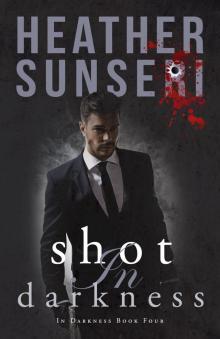 Shot in Darkness
Shot in Darkness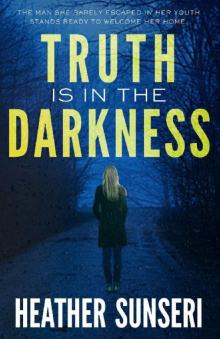 Truth is in the Darkness (Paynes Creek Thriller Book 2)
Truth is in the Darkness (Paynes Creek Thriller Book 2)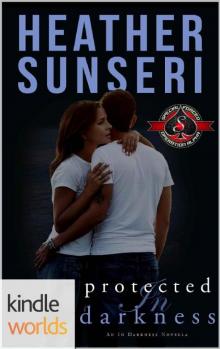 Special Forces: Operation Alpha: Protected in Darkness (Kindle Worlds Novella)
Special Forces: Operation Alpha: Protected in Darkness (Kindle Worlds Novella) Desired in Darkness
Desired in Darkness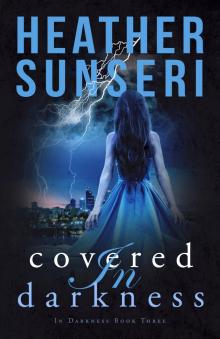 Covered in Darkness
Covered in Darkness Deceived
Deceived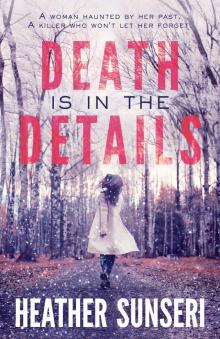 Death is in the Details
Death is in the Details Exposed in Darkness
Exposed in Darkness Emerge
Emerge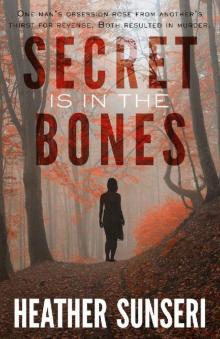 Secret is in the Bones (Paynes Creek Thriller Book 3)
Secret is in the Bones (Paynes Creek Thriller Book 3) Mindsiege
Mindsiege Mindsurge (Mindspeak Book 3)
Mindsurge (Mindspeak Book 3)